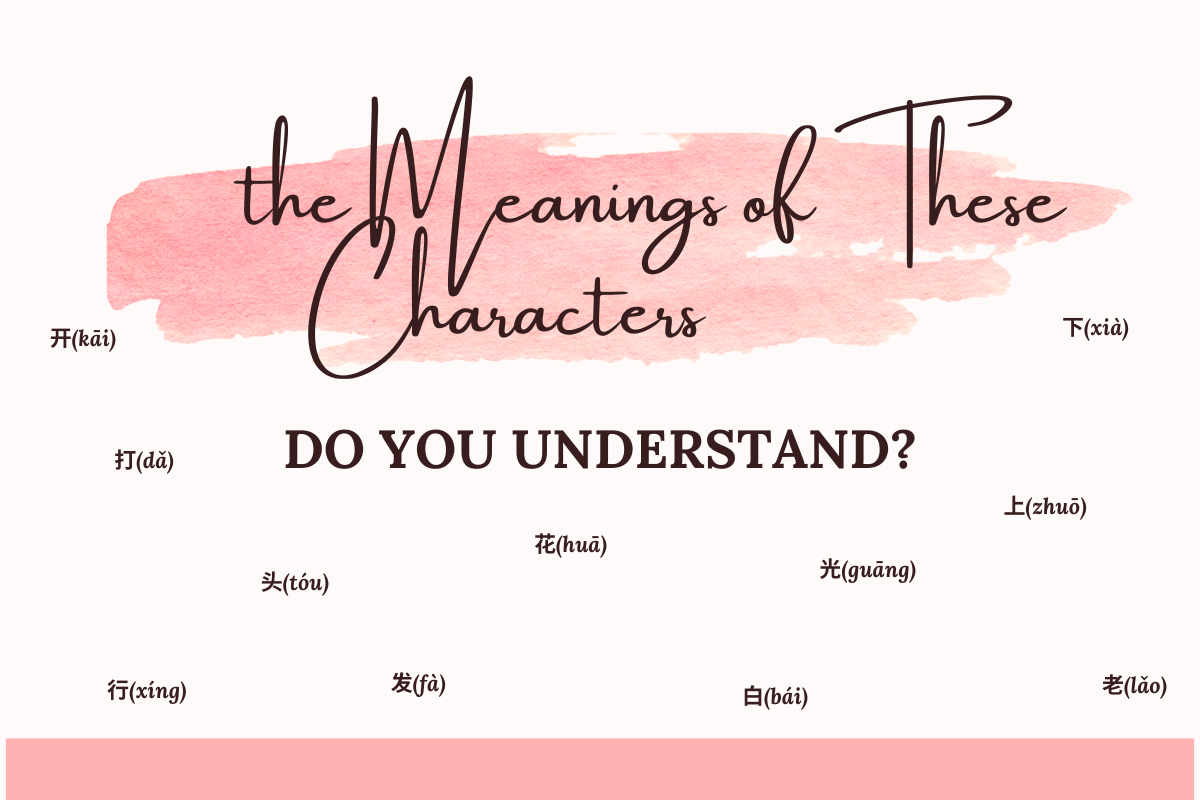Do You Understand the Meanings of These Characters?
Monday, March 10, 2025
In China, there are many interesting Chinese characters, often carrying rich meanings that can be expressed differently in various sentences. Have you encountered the meanings of these characters before?

打(dǎ)
To indicate striking:
打鼓(dǎ gǔ)
to beat a drum
To signify making a phone call:
打电话给朋友(dǎ diàn huà gěi péng you)
calling a friend
To indicate opening:
打开门(dǎ kāi mén)
to open a door
To represent engaging in an activity:
打篮球(dǎ lán qiú)
playing basketball
To denote producing or making:
打毛衣(dǎ máo yī)
knitting a sweater
花(huā)
To represent a plant:
花园里的花(huā yuán lǐ de huā)
flowers in the garden
To signify expenditure:
花钱(huā qián)
to spend money
To indicate a pattern or design:
衣服上的花纹(yī fu shàng de huā wén)
patterns on clothing
To signify blurred vision or dizziness:
眼花(yǎn huā)
dizzy eyes
头(tóu)
To represent a body part:
头疼(tóu téng)
headache
To indicate a starting point:
从头开始(cóng tóu kāi shǐ)
starting from scratch
To signify leadership:
他是我们的头儿(tā shì wǒ men de tóur)
he is our leader.
To be used as a measure word:
一头牛(yī tóu niú)
one head of cattle
行(xíng)
To indicate walking:
步行(bù xíng)
walking
To signify permission or feasibility:
这样做行不行?(zhè yàng zuò xíng bù xíng)
Is this method feasible?.
To represent a profession or industry:
他在银行工作。(tā zài yín háng gōng zuò)
He works at a bank.
To suggest a line or row:
排成一行(pāi chéng yī háng)
lined up in a row
发(fà)
To represent hair:
理发(lǐ fà)
getting a haircut
To indicate emitting:
发邮件(fā yóu jiàn)
send an email
To denote development or growth:
经济发展(jīng jì fā zhǎn)
economic development
To signify launching or firing:
发射火箭(fā shè huǒ jiàn)
launching a rocket

光(guāng)
To indicate light or radiance:
阳光(yáng guāng)
sunlight
To signify smoothness:
光溜溜的石头(guāng liū liū de shí tou)
smooth stone
To denote only or solely:
光说不做(guāng shuō bù zuò)
All talk and no action.
To mean complete or exhausted:
钱花光了(qián huā guāng le)
money spent
老(lǎo)
To represent old age:
老人(lǎo rén)
elderly person
To indicate antiquity or oldness :
老房子(lǎo fáng zi)
old house
To denote frequent occurrence:
老迟到(lǎo chí dào)
habitually late
Used as a prefix:
老师(lǎo shī)
teacher
上(zhuō)
To indicate a position:
桌子上(zhuō zi shàng)
on the table
To signify upwards direction:
上楼(shàng lóu)
going upstairs
To signify adding or serving:
上菜(shàng cài)
serving dishes
To indicate the beginning of something:
上课(shàng kè)
start of a class
下(xià)
To indicate a position:
桌子下(zhuō zi xià)
under the table
To signify downward direction:
下楼(xià lóu)
going downstairs
To signify the end or conclusion:
下课(xià kè)
end of class
To denote reduction or decrease:
下火 (xià huǒ)
fire subsiding
开(kāi)
To indicate opening:
开门(kāi mén)
open the door
To represent the commencement of something:
开学(kāi xué)
start of school
To signify driving or operating:
开车(kāi chē)
driving a car
To denote hosting or conducting:
开会(kāi huì)
hold a meeting
白(bái)
To represent the color white:
白色的衣服(bái sè de yī fu)
white clothes
To signify blankness or emptiness:
白纸(bái zhǐ)
blank paper
To indicate in vain or futile:
白忙一场(bái máng yī chǎng)
futile busyness
To denote clarity or revelation:
真相大白(zhēn xiàng dà bái)
the truth revealed
Sign up for a free trial now!
FAQ / Tips
Our students come from a wide range of ages, from 3 years old to over 80 years old. Our courses are tailored to each student's age and proficiency level to ensure they can receive maximum benefit and progress. Whether you want to learn Chinese as a second language or improve your existing Chinese skills, we can provide you with courses and resources that are suitable for you
Our Chinese learning method is focused on personalized and interactive one-on-one lessons with a professional teacher. The lessons are conducted live through our online teaching platform, which allows you to see and talk to the teacher. You can schedule the lessons at a time that suits you, and the teacher will tailor the lesson content to your specific needs and goals. During the lesson, you can ask questions and receive feedback from the teacher to ensure you understand and master the knowledge and skills being taught. We also have a student service team and academic coordinator team to assist you with your learning and provide any additional support you may need.Overall, our method is designed to be flexible, personalized, and interactive to help you achieve your language learning goals.
Our learning is different from traditional language learning in a number of ways. Firstly, we use technology to enhance the learning experience and provide personalized learning paths for each student. Secondly, our focus is not just on language proficiency, but also on cultural understanding and practical application of the language.Thirdly, we place a strong emphasis on developing speaking and listening skills, as well as reading and writing.Additionally, we incorporate modern teaching methods and materials, such as multimedia resources and interactive exercises.Finally, our courses are designed to be flexible and adaptable, allowing students to learn at their own pace and according to their own schedule.
Before starting any Chinese language course, the teacher will assess your Chinese language proficiency level through a placement test.This helps to determine your current level of understanding and ability in Chinese, and allows the teacher to tailor the course materials and teaching methods to your specific needs and goals. The placement test may include assessments of your reading, writing, listening, and speaking skills.Based on the results of the test, the teacher will be able to recommend an appropriate course of study for you.
As a first - time student, if you are not completely satisfied with our service, we offer a cancellation policy that allows you to cancel your subscription before the first month. In such cases, we only charge a one - month fee and refund the remaining balance to you as soon as possible.We strive to ensure that our customers are fully satisfied with our service and are committed to providing a hassle - free refund process.
Yes, our website offers courses in both traditional and simplified Chinese characters. You can choose the character set that you want to learn based on your personal preference or learning goals.Our courses are designed to accommodate learners of all levels and backgrounds, so whether you are a beginner or an advanced learner, we have resources that can help you improve your Chinese language skills.